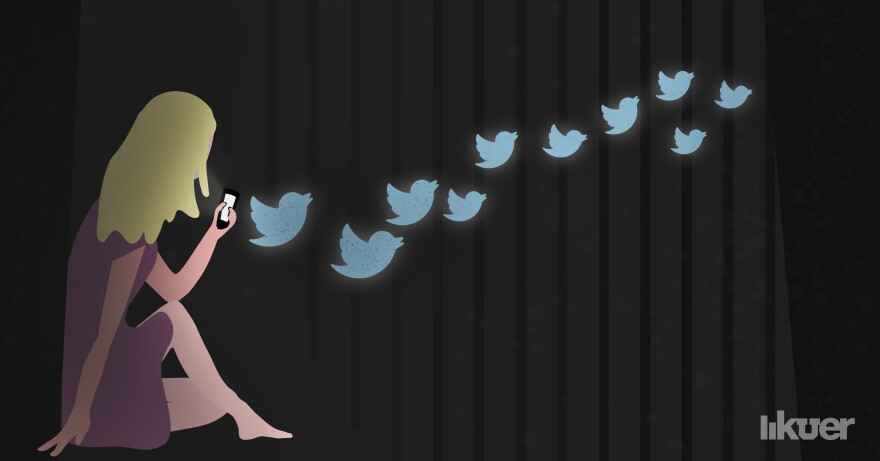Editors note: This story includes descriptions of sexual assault that may be disturbing to some readers.
Earlier this summer, 21-year-old Maya Micheli was at a Black Lives Matter protest in Portland, Oregon, where they now live. When they got home, they started scrolling through Facebook and Twitter, mainly just looking for updates on the protests and news about the police.
“I was up at like 3:00 in the morning,” Micheli said. “And I couldn't go to sleep.”
Then, Micheli saw the hashtag #UtahRapists. It’s used in Utah to share stories of sexual assault on social media and to compile lists of alleged perpetrators.

Micheli’s mind flashed back to high school in Logan, Utah.
They typed up their story of an alleged assault that happened then, and posted it on social media with that hashtag.
“September 25 was just like any other day,” the post began. Micheli said they went over to their then-boyfriend’s house to take a nap after school and laid down on his bed. When Micheli was almost asleep, they said he started to penetrate them.
“Chest pressed hard. No longer sinking. Stuck. Suffocating. Freeze. Yell. Say. Say no. What's wrong with you?” the post said.
Even though they declined to press charges, Micheli said they shared their story now to feel heard, and they hope they might get some sort of justice, like their alleged assailant losing his job.
KUER contacted the family of Micheli’s alleged perpetrator. He declined to comment. His mother said the accusations were false and would not give any further comment for this story.
Since posting their account of that afternoon, Micheli said more than a dozen people have reached out to them to share similar experiences with that same man. Reading those stories made Micheli feel less alone.
“To finally have names and faces and stories make me feel a little less crazy,” they said. “Because sometimes I feel crazy. Sometimes I feel like … Did it happen? Because if it did happen, how is it that no one cares?”
Seeing other people’s stories online, even if they aren’t about the same assailant, can change how people understand their own experiences, according to Chris Linder, a University of Utah professor who studies sexual assault on college campuses.
“Survivors are questioning whether what they experienced was bad enough to count as sexual assault,” Linder said. “So I think when people start seeing other people's stories, they’re like ‘Yes! I knew what I experienced was not OK, but either I didn't have language for it or I thought I was making too big of a deal out of it.’”

Read the full story.
Though 24-year-old Lexey Kirkland said she’s never been sexually assaulted, #UtahRapists did make her re-evaluate some behavior she witnessed when she was a student at Bountiful High School from 2012 to 2015.
“The guys would call it ‘rape kissing,’” Kirkland said.
She said it happened between classes or at basketball games, really in any big public group. Boys would make a big circle, with a guy in the middle, “and then they would push some girl into the circle and they'd make the circle smaller and smaller until those people would be pretty much forced to kiss.”
Kirkland said it was just normal.
“It's hard looking back and knowing we were using the word ‘rape,’ which is such a strong word,” she said.
A spokesman for the principal of Bountiful High at the time said the administration was aware of one similar incident and disciplined those involved but that they weren’t aware that it was a recurring problem. He said if they had known, they would have intervened.
Kirkland said she posted under the hashtag to bring awareness to behavior that made it seem normal to violate someone’s consent by essentially forcing them to kiss.

Sharing these stories is about more than feeling less alone for Micheli, too. They also want to warn people about the alleged perpetrator. That’s another way Utahns are using the hashtag: to create lists of people accused of these crimes.
This hashtag was one of several that popped up around the country this summer, but the practice long predates social media, Linder said.
“It reminds me of things I read about happening in the ‘70s on college campuses where women were compiling those lists and basically making copies of them and distributing [them] all over campus,” she said.
Social media has made it much easier for survivors to share that information, Linder said.
Perhaps the most well-known example is the #MeToo movement, which led to the resignations and firings of several high profile people in media and politics.
But Micheli said they felt like that movement wasn’t for them because they and their alleged assailant were in high school, and neither are public figures. Micheli posted about their experience during the height of #MeToo and said it didn’t get nearly as much attention as their post this summer.
“I think the #MeToo movement was very strong for specific people coming forward,” they said. “But for someone like me … it's not like anyone really cared about him to begin with. So it wasn't talked about.”
Seeing people they went to high school with post stories under #UtahRapists made Micheli believe that this time people might actually listen.



